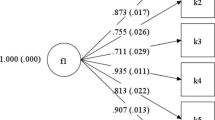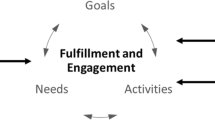Abstract
Postpartum depression is a serious health issue affecting as many as 10–15 % of postpartum women. This longitudinal study aimed to explore how psychological variables such as cognitive emotion regulation strategies, breastfeeding self-efficacy (BSE), and dimensions of social support predicted postpartum depressive symptoms (Edinburgh Postnatal Depression Scale). The data were collected with web-based survey questionnaires between May 2008 and December 2009, in a sample of 737 new mothers. The same questionnaire was surveyed at three points in time: 6 weeks, 3 months, and 6 months postpartum. Data were analyzed using multilevel modeling (level 1, time points; level 2, person). Results showed that BSE, certain cognitive emotion regulation strategies, perceived available support, and need for support predicted the rate of postpartum depressive symptoms. Only breastfeeding self-efficacy predicted change in postpartum depressive symptoms. This study illustrates the importance of psychological variables with regard to postpartum depressive symptoms. Implications for preventative efforts are discussed.
Similar content being viewed by others
References
Aldao A, Nolen-Hoeksema S (2010) Specificity of cognitive emotion regulation strategies: a transdiagnostic examination. Behav Res Ther 48:974–983
Bandura A (1977) Self-efficacy: toward a unifying theory of behavioral change. Psychol Rev 84(2):191–215
Bandura A (1994) Self-efficacy. In: Ramachaudran VS (ed) Encyclopedia of human behavior, vol 4. Academic Press, New York, pp 71–81, Reprinted in H. Friedman (ed). Encyclopedia of mental health. Academic Press, San Diego, 1998
Beck CT (1996) A meta-analysis of predictors of postpartum depression. Nurs Res 45(5):297–303
Beck CT (2001) Predictors of postpartum depression: an update. Nurs Res 50(5):275–285
Berle JØ, Aarre TF, Mykletun A, Dahl AA, Holsten F (2003) Screening for postnatal depression: validation of the Norwegian version of the Edinburgh postnatal depression scale, and assessment of risk factors for postnatal depression. J Affect Disord 76:151–156
Bloch M, Rotenberg N, Koren D, Klein E (2005) Risk factors associated with the development of postpartum mood disorders. J Affect Disord 88(1):9–18
Blyth R, Creedy DK, Dennis C-L, Moyle W, Pratt J, Vries SMD (2002) Effects of maternal confidence on breastfeeding duration: an application of breastfeeding self-efficacy theory. Birth 29(4):278–284
Bonari L, Bennett H, Einarson A, Koren G (2004) Risks of untreated depression during pregnancy. Can Fam Physician 50:37–39
Boyd RC, Le HN, Somberg R (2005) Review of screening instruments for postpartum depression. Arch Wom Ment Health 8:141–153
Brockington I (2004) Postpartum psychiatric disorders. Lancet 363(9405):303–310
Callen J, Pinelli J (2004) Incidence and duration of breastfeeding for term infants in Canada, United States, Europe and Australia. Birth 31(4):285–292
Campbell-Sills L, Barlow DH (2007) Incorporating emotion regulation into conceptualizations and treatments of anxiety and mood disorders. In: Gross J (ed) Handbook of emotion regulation. The Guilford Press, New York
Coleman PK, Karraker KH (1997) Self-efficacy and parenting quality: findings and future applications. Dev Rev 18:47–85
Collins NL, Dunkel-Schetter C, Lobel M, Scrimshaw SCM (1993) Social support in pregnancy: psychological correlates of birth outcomes and postpartum depression. J Pers Soc Psychol 65(6):1243–1258
Cox JL, Holden JM, Sagovsky R (1987) Detection of postnatal depression. Development of the 10-item Edinburgh postnatal depression scale. Br J Psychiatr 150:782–786
Cutrona CE, Troutman BR (1986) Social support, infant temperament and parenting self-efficacy: a mediational model of postpartum depression. Child Dev 57:1507–1518
Dai X, Dennis CL (2003) Translation and validation of the Breastfeeding Self-Efficacy Scale into Chinese. J Midwifery Wom Health 48(5):350–356
Dennis C-L (2002) Breastfeeding initiation and duration: a 1990–2000 literature review. JOGN Nursing 31(1):12–32
Dennis C-L (2003) The breastfeeding self-efficacy scale: psychometric assessment of the short form. JOGN Nursing 32(6):734–744
Dennis C-L, Faux S (1999) Development and psychometric testing of the breastfeeding self-efficacy scale. Res Nurs Health 22:399–409
Dunkel-Schetter C, Bennett TL (1990) Differentiating the cognitive and behavioral aspects of social support. In: Sarason BR, Sarason IG, Pierce GR (eds) Social support: an interational view. Wiley, New York
Eberhard-Gran M, Eskild A, Tambs K, Schei B, Opjordsmoen S (2001) The Edinburgh Postnatal Depression Scale: validation in a Norwegian community sample. Nord J Psychiatr 55:113–117
Eberhard-Gran M, Slinning K (2007) Nedstemthet og depresjon i forbindelse med fødsel. Folkehelseinstituttet
Eberhard-Gran M, Garthus-Niegel S, Garthus-Niegel K, Eskild A (2010) Postnatal care: a cross-cultural and historical perspective. Arch Womens Ment Health 13(6):459–466
Garnefski N, Kraaij V (2006) Cognitive emotion regulation questionnaire: development of a short 18-item version (CERQ-short). Pers Indiv Differ 41:1045–1053
Garnefski N, Kraaij V, Spinhoven PH (2001) Negative life events, cognitive emotion regulation and depression. Pers Indiv Differ 30:1311–1327
Goodman SH, Brogan D, Lynch ME, Shielding B (1993) Social and emotional competence in children of depressed mothers. Child Dev 64:516–531
Gross JJ, Richards JM, John OP (2006) Emotion regulation in everyday life. In: Snyder DK, Simpson J, Hughes JN (eds) Emotion regulation in couples and families: pathways to dysfunction and health. American Psychological Association, Washington, DC, pp 13–35
Haggkvist AP, Brantsaeter AL, Grjibovski AM, Helsing E, Meltzer HM, Haugen M (2010) Prevalence of breast-feeding in the Norwegian Mother and Child Cohort Study and health service-related correlates of cessation of full breast-feeding. Public Health Nutr. doi:10.1017/S1368980010001771
Harris B, Huckle P, Thomas R, Johns S, Fung H (1989) The use of rating scales to identify post-natal depression. Br J Psychiatr 154:813–817
Haslam DM, Pakenham KI, Smith A (2006) Social support and postpartum depressive symptomatology: the mediating role of maternal self-efficacy. Infant Mental Health J 27(3):276–291
Horowitz JA, Goodman JH (2005) Identifying and treating postpartum depression. JOGNN Clin Issues 34:264–273
Howell EA, Mora P, DiBonaventura MD, Leventhal H (2009) Modifiable factors associated with changes in postpartum depressive symptoms. Arch Wom Ment Health 12:113–120
Howell EA, Mora P, Leventhal H (2006) Correlates of early postpartum depressive symptoms. Matern Child Health J 10(2):149–157
Hox JJ (2010) Multilevel analysis: techniques and applications, 2nd edn. Routledge, New York
Lakey B, Drew JB (1997) A social–cognitive perspective on social support. In: Pierce GR, Lakey B, Sarason IG, Sarason BR (eds) Sourcebook of social support and personality. Plenum Press, New York
Larsen RJ, Prizmic Z (2004) Affect regulation. In: Baumeister RF, Vohs KD (eds) Handbook of self-regulation. Research, theory, and application. Guilford Press, New York
Lovestone S, Kumar R (1993) Postnatal psychiatric illness: the impact on partners. Br J Psychiatr 163:210–216
Mennin DS, Holoway RM, Fresco DM, Moore MT, Heimberg RG (2007) Delineating components of emotion and its dysregulation in anxiety and mood psychopathology. Behav Ther 38:284–302
Misri S, Sinclair SA, Kuan AJ (1997) Breast-feeding and postpartum depression: is there a relationship? Can J Psychiatr 42:1061–1065
Munk-Olsen T, Munk Laursen T, Bøcker Pedersen C, Mors O, Bo Mortensen P (2006) New parents and mental disorders: a population-based register study. J Am Med Assoc 296(21):2582–2589
Nolen-Hoeksema S, Stice E, Wade E, Bohon C (2007) Reciprocal relations between rumination and bulimic, substance abuse, and depressive symptoms in female adolescents. J Abnorm Psych 116:198–207
Nolen-Hoeksema S, Wisco BE, Lyubomirsky S (2008) Rethinking rumination. Perspect Psychol Sci 3:400–424
O’Hara MW, Swain AM (1996) Rates and risk of postpartum depression—a meta-analysis. Int Rev Psychiatr 8:37–54
Pippins JR, Brawarsky P, Jackson RA, Fuentes-Afflick E, Haas JS (2006) Association of breastfeeding with maternal depressive symptoms. J Wom Health 15(6):754–762
Ramchandani P, Stein A, Evans J, O’Connor TG (2005) Paternal depression in the postnatal period and child development: a prospective population study. Lancet 365(9478):2201–2205
Robertson E, Grace S, Wallington T, Stewart DE (2004) Antenatal risk factors for postpartum depression: a synthesis of recent literature. Gen Hosp Psychiatr 26:289–295
Schaefer C, Coyne JC, Lazarus RS (1981) The health-related functions of social support. J Behav Med 4:381–406
Schwarzer R, Knoll N (2007) Functional roles of social support within the stress and coping process, a theoretical and empirical overview. Int J Psych 42(4):243–252
Schwarzer R, Leppin A (1991) Social support and health: a theoretical and empirical overview. J Soc Pers Relat 8:99–127
Schwarzer R, Schulz U (2000) Berlin Social Support Scale (BSSS). Retrieved 12.08, 2008, from http://userpage.fu-berlin.de/∼health/soc_e.htm
Singer J, Willett J (2003) Applied longitudinal data analysis: modelling change and event occurrence. Oxford University Press, New York
Statistics Norway (2003) Norske mødre ammer mye. Retrieved 1.09.08. from http://www.ssb.no/emner/03/01/kostspe/main.html
Stern DN (1998) The motherhood constellation: a unified view of parent–infant psychotherapy. Karnac Books, London
World Health Organization (2001) The optimal duration of exclusive breastfeeding. WHO, Geneva
Ystrøm E, Niegel S, Klepp K-I, Vollrath ME (2008) The impact of maternal negative affectivity and general self-efficacy on breastfeeding: the Norwegian mother and child cohort study. J Pediatr 152:68–72
Author information
Authors and Affiliations
Corresponding author
Rights and permissions
About this article
Cite this article
Haga, S.M., Ulleberg, P., Slinning, K. et al. A longitudinal study of postpartum depressive symptoms: multilevel growth curve analyses of emotion regulation strategies, breastfeeding self-efficacy, and social support. Arch Womens Ment Health 15, 175–184 (2012). https://doi.org/10.1007/s00737-012-0274-2
Received:
Accepted:
Published:
Issue Date:
DOI: https://doi.org/10.1007/s00737-012-0274-2




